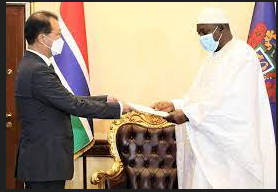By Lamin Kujabi
His Excellency Kim Ji-Joon, the new Ambassador of Republic of South Korea designated to The Gambia, on Friday, May 6th presence his letter of credence to His Excellency President Adama Barrow at State House in Banjul, where he revealed his intention to strengthen cooperation between Banjul and Soul, especially in the areas of agriculture and skills development.
Ambassador Ji-Joon was accompanied to the State House by MomodouTangara, Minister of Foreign affairs, International Cooperation and Gambians Abroad; and Muhammed Jah, Chief Executive Officer of Qgroup and Honorary Consul Generation of Republic of South Korea to The Gambia.
In his remarks after the presentation ceremony, Ambassador Kim Ji-Joon noted that The Gambia and South Korea have a long relationship since after Gambia’s independence. He said his country has been supporting Gambia both at national and international levels, including at the United Nations; as well as provided projects to support The Gambia’s peace building process.
He informed that he and Muhammed Jah are working very closely this time to promote agriculture in order to enhance food security in the country. He wishes to introduce some Korean rice varieties in the country which can be harvested more than five to six times in a season.
Ambassador Kim Ji-Joon disclosed that another plan is to establish a professional skill training centre in The Gambia.
“His Excellency President Adama Barrow is committed to solving food security problem in the country. It is a very small country and with the science and technology we can address this problem. The President has welcomed this initiative”.
He revealed that similar varieties were planted in Guinea Bissau which has the same soil and climate like The Gambia.
CEO Muhammed Jah of Q-group and Consul of Republic of South Korea to The Gambia said as a businessman representing South Korea in The Gambia, he looks at business areas that will drive our economy forward.
“The President has been vocal agriculture and food security and skill development. I have worked very hard for the Korean government to look at these areas and we have received a positive result from these two areas. They have agreed to work with us. We will implement as a public private partnership programme to grow enough rice to feed ourselves, and even export it”.
He affirmed that the rice varieties being introduced are tested in Guinea Bissau and Senegal and that the results in Guinea will be coming out in June this year. We will be working with the Republic of South Korea so that in the next few years Gambia will not import rice anymore,” he Mr Jah predicted.

